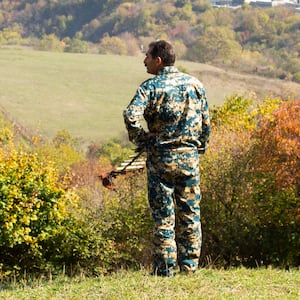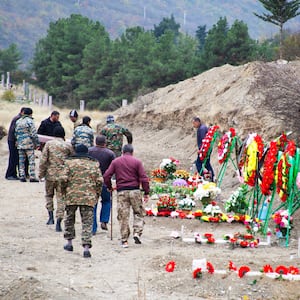Vladimir Putin’s backyard just got a whole lot smaller.
A year and a half after the Russian president’s rash, illegal, blundering invasion of Ukraine, Russian peacekeepers have been forced to admit defeat in the faraway enclave of Nagorno-Karabakh, handing control back to Azerbaijan after a 24-hour military offensive, which killed a senior Russian officer.
For Azerbaijan, which began talks with Karabakh’s Armenian separatist leaders on Thursday to formally take back control of the region, it looked like a surprisingly swift conclusion to a 35-year conflict that has cost thousands of lives.
But for Putin's Russia, it’s an equally stunning loss, proof that Moscow's writ no longer holds in the Caucasus and that the post-Soviet security bloc Putin set up to mirror NATO in the region—the Collective Security Treaty Organization (CSTO)—is a spent force.
And the Russian dictator has only himself to blame.
In the two full-on wars fought over Nagorno-Karabakh, from 1988 to 1994 and again in 2020, the separatists had full military and political support from Armenia itself and, indirectly, from Russia.
But since the Russian invasion of Ukraine, the Caucasus calculus has changed. Armenia took no action as Azerbaijan moved to cut off its supply route to Nagorno-Karabakh, the Lachin Corridor, over the past year. Then, earlier this month, Armenia held its first joint military exercises with the United States, clearly turning its back on the CSTO.
On Tuesday, emboldened by events, Azerbaijan President Ilham Aliyev ordered the offensive, his troops quickly capturing key heights and strategic junctions in Nagorno-Karabakh. The separatists crumbled, agreeing to a ceasefire backed by Russian peacekeepers.
Amid the violence at least two Russians were killed, reportedly including the deputy commander of Russia’s North Fleet submarine forces, Captain First Rank (Colonel) Ivan Kovgan, who was seconded to the region with Russian forces stretched desperately thin.
Under the terms of the CSTO, any military aggression against one member is seen as an attack on all of them, just like NATO’s Article 5, but Russia did nothing to stop the latest incursion.
In an interview earlier this month with Politico, Armenian Prime Minister Nikol Pashinyan spelled out clearly what was going on: Armenia could no longer rely on Moscow to guarantee its safety and had to assert its own independence. “As a result of the events in Ukraine, the capabilities of Russia have changed,” Pashinyan said. “We want to have an independent country, a sovereign country, but we have to have ways to avoid ending up in the center of clashes between West and East, North and South."
It is clear that the bloodshed is not yet over. Thousands have joined protests on the streets of Yerevan this week to protest Pashinyan’s perceived desertion of Armenians inside Nagorno-Karabakh, known to Armenians as Artsakh. Despite the ceasefire, there are still reports of fighting in the mountainous region.
The Karabakh conflict began in the late Soviet era when Armenians inside the enclave demanded that it be transferred from the control of Azerbaijan to Armenia—both then still Soviet republics.
The main man in Soviet Azerbaijan was Heydar Aliyev, a former KGB official who became the first president of independent Azerbaijan in 1983. After his death in 2003, his son Ilham took over, thanks to rigged elections, and has held power ever since after doing away with constitutional term limits.
If Putin, abandoned by yet another ally as Armenia turns towards NATO, is the big geopolitical loser in the latest Caucasian crisis, the big winner—this may have a familiar ring—is Turkish President Recep Tayyip Erdogan.
Turkey has long been Azerbaijan’s key ally, supporting it through the various Karabakh conflicts. As Aliyev carved out a post-Soviet role for his nation, primarily as an energy producer, he has developed increasingly close ties with the Turkic-speaking nations of Central Asia and with Erdogan himself.
In June 2021, Aliyev even took Erdogan on a visit to an area of Nagorno-Karabakh recaptured the previous year in a 44-day conflict that laid the ground for this week’s victory. Armenia called the visit “an outright provocation against regional peace and security,” but the Turkish leader's message was unmistakable: that this is now his backyard.








